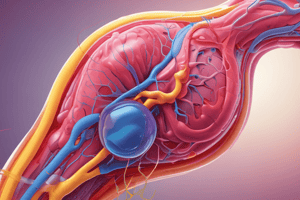Podcast
Questions and Answers
What is the primary function of antidiuretic hormone (ADH) in urine formation?
What is the primary function of antidiuretic hormone (ADH) in urine formation?
- Promotes reabsorption of water in the nephron (correct)
- Stimulates the production of urine
- Increases the concentration of electrolytes in urine
- Increases blood flow to the kidneys
In which part of the nephron does ADH primarily exert its effects?
In which part of the nephron does ADH primarily exert its effects?
- Glomerulus
- Loop of Henle
- Collecting duct (correct)
- Proximal convoluted tubule
What are kidney stones primarily composed of?
What are kidney stones primarily composed of?
- Bilirubin and ammonia
- Glucose and electrolytes
- Calcium salts, uric acid, and struvite (correct)
- Uric acid and creatinine
What condition is most likely indicated by very low levels of ADH and the production of large amounts of dilute urine?
What condition is most likely indicated by very low levels of ADH and the production of large amounts of dilute urine?
What is the normal value for the Glomerular Filtration Rate (GFR)?
What is the normal value for the Glomerular Filtration Rate (GFR)?
Which of the following is NOT a common cause of kidney stones?
Which of the following is NOT a common cause of kidney stones?
In which part of the nephron does glucose reabsorption primarily occur?
In which part of the nephron does glucose reabsorption primarily occur?
What primarily causes diabetic nephropathy?
What primarily causes diabetic nephropathy?
What is a common consequence of chronic renal failure?
What is a common consequence of chronic renal failure?
Which condition is characterized by inflammation of the glomerulus?
Which condition is characterized by inflammation of the glomerulus?
What happens in the kidneys due to Diabetes insipidus?
What happens in the kidneys due to Diabetes insipidus?
What is the renal threshold of glucose approximately?
What is the renal threshold of glucose approximately?
What is a primary cause of kidney stones?
What is a primary cause of kidney stones?
Flashcards are hidden until you start studying
Study Notes
Nephron
- The structural and functional unit of the kidney
Glomerular Filtration Rate (GFR)
- The rate at which plasma is filtered by the kidney glomeruli
- Normal value is 125 ml/min
Common Disorders of the Urinary System
- Analgesic Neuropathy
- Long-term use of painkillers, especially nonsteroidal anti-inflammatory drugs (NSAIDs)
- Ibuprofen and naproxen, particularly when combined with caffeine, are problematic
- Chronic Renal Failure
- Progressive kidney disease
- Progression can be controlled by treating underlying causes like hypertension and high cholesterol
- End-stage renal failure requires dialysis or renal transplantation
- Diabetes Insipidus
- Too little ADH production or the kidneys are insensitive to ADH
- Large urinary output, often leading to dehydration
- Risk of brain damage due to low sodium levels
- Glomerulonephritis
- Inflammation of the glomerulus, damaging the filter
- Blood and blood cells appear in the urine (hematuria)
- Decreased waste product removal and electrolyte imbalance
- Diabetic Nephropathy
- High blood glucose levels from diabetes damage the kidney's blood filtering part
- Damaged filter becomes leaky, leading to proteinuria and glycosuria
- Kidney Stones (Renal Calculi/ Neprolithiasis/ Urolithiasis)
- Hard deposits of minerals and salts form in the kidneys
- Polycystic Kidney Disease (PKD)
- Clusters of cysts develop primarily in the kidneys, causing gradual kidney damage
Case 1: Diabetic Nephropathy
- Pathophysiology: High blood glucose levels damage the glomerulus, making it leaky and causing proteinuria and glycosuria.
- Glucose Reabsorption: Proximal convoluted tubule
- Renal Threshold of Glucose: The blood glucose level at which glucose starts appearing in the urine. Approximate value is 180 mg/dL (10 mmol/L).
Case 2: Kidney Stones
- Definition: Hard deposits of minerals and salts, primarily calcium oxalate, calcium phosphate, uric acid, and struvite, that form in the kidneys.
- Causes: Dehydration, high calcium intake, high uric acid levels, infections, and certain metabolic disorders.
- Urine Formation Steps:
- Filtration: Blood is filtered in the glomerulus, creating filtrate.
- Reabsorption: Useful substances are reabsorbed back into the bloodstream from the filtrate.
- Secretion: Waste products are secreted from the blood into the filtrate.
- Excretion: The final urine is excreted from the body.
Case 3: Diabetes Insipidus
- Diagnosis: Diabetes Insipidus based on low ADH levels, large amount of dilute urine despite water deprivation, symptoms of thirst and frequent urination.
- ADH Action: ADH acts on the collecting ducts and distal convoluted tubule of the nephron.
- ADH Function: ADH increases the permeability of the collecting ducts to water, allowing for more water reabsorption and the production of concentrated urine.
Studying That Suits You
Use AI to generate personalized quizzes and flashcards to suit your learning preferences.




